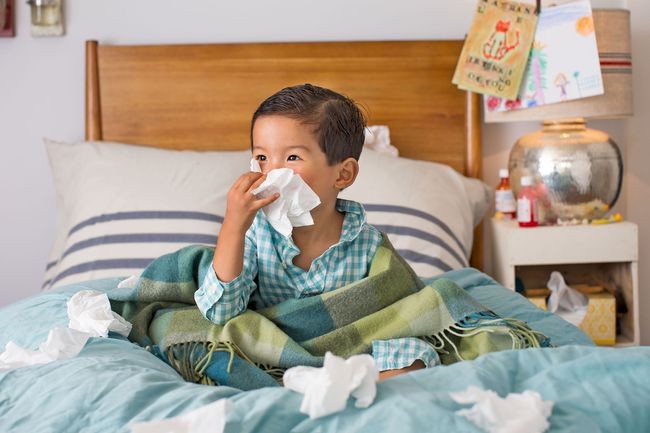How to Teach Your Kid to Blow His Nose
Don’t wait until he gets a cold to help him master the skill of blowing his nose. A kid as young as 2 can learn how. Your child is probably already pretty good at blowing air out of his mouth (thanks, bubble wands and birthday candles!), and he can use the same concept to clear his nostrils.
To practice, gently place a finger over your child’s lips to show him that he can make air come out of his nose, says Katherine O’Connor, M.D., a mom of three and a pediatrician at the Children’s Hospital at Montefiore, in New York City. You can also teach him to blow bubbles underwater during a bath and then have him apply the same technique when his nose feels stuffed up.
But if your kid learns best through play, challenge him to this fun race: Have him move a cotton ball, a feather, or a little ball of tissue paper across a flat surface as fast as possible—using only his nose! (Just be prepared for sprays of snot, and wipe down the surface afterward.)

When it’s time for tissues, place one over your child’s nose and press down on his left nostril while he blows out of his right. Repeat with the other nostril, then let him do it. It’s always helpful to demonstrate it yourself. “Young kids love to imitate, so they are more likely to try to use tissues on their own if they see you using them first,” says Rebecca G. Carter, M.D., a mom of two and a pediatrician at the University of Maryland Children’s Hospital, in Baltimore. You can also show him by using tissues and pretend sneezing into your arm during playtime.
To make sure that germy tissues get disposed of properly, take advantage of your kid’s eagerness to be helpful by giving him the “garbage collector” job for a few minutes daily. “Even if he misses the pail when he tosses a wrapper or a used napkin, it’ll show him that he can help you in small ways around the house,” says Dr. Carter, who successfully used this strategy with both her kids. When your child does get sick, throwing out his used tissues will be a natural extension of what he already knows how to do.
Previous:Development Skills Every Toddler Should Have
Next:Everything You Need to Know About Adrenarche: A Surge in Hormones That Happens Before Puberty
-
How do babies learn to talk | Stages of speech development | What causes language delays | How can parents help babies start talking When do babies start talking In general, babies start uttering their first words somewhere between 9 and 14 months.
-
A persons childhood shapes much of their personality and determines who they become later in life. For this reason, early childhood social development has become increasingly important to individuals interested in the emotional and mental well-being
-
It can happen to you. Your child will be lying on the floor in the middle of the supermarket having a full-blown meltdown. You will get judgmental or sympathetic looks from other shoppers, depending on their experiences. You shouldn’t feel guil


